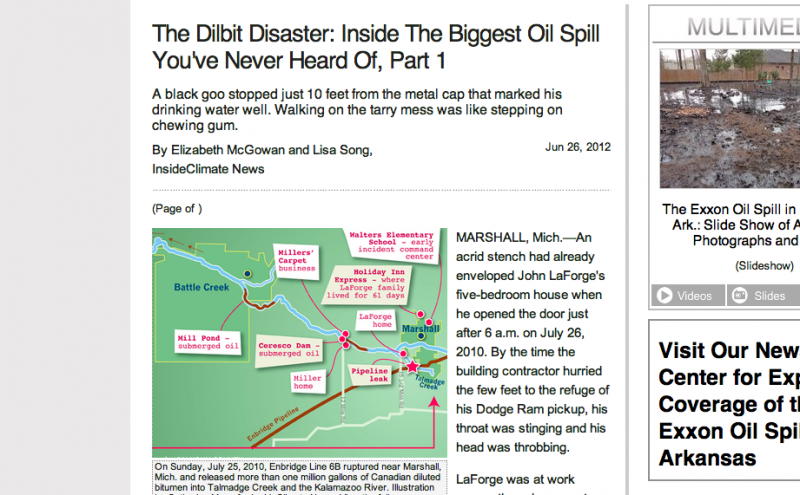I used to work with Susan White at ProPublica but even I was completely surprised yesterday when InsideClimate News, the non-profit news website she now leads, won the Pulitzer Prize for National Reporting for an in-depth investigation of a 2010 pipeline spill in Michigan.
Don’t remember that spill? Maybe that’s why InsideClimate titled its story, “the biggest oil spill you’ve never heard of.”
You might also describe InsideClimate News as “the online news startup you’ve never heard of” – I wouldn’t know anything about it if it hadn’t been where Susan moved to. The surprise isn’t that she led yet another Pulitzer Prize project (she edited two such projects already at the San Diego Union Tribune and ProPublica) – it’s that InsideClimate News just seemed too small, too novel of a news organization to earn the Pulitzer committee’s notice.
At just 5 years old and with only 7 full-time reporters, InsideClimate News is likely the smallest news organization ever to win in the National Reporting category (see table below), and perhaps the smallest news organization ever to win any Pulitzer since the Point Reyes Light in 1979.
Here’s another size measurement: According to the AP, InsideClimate had about 200,000 page views last month. The winner of last year’s National Reporting Pulitzer, the Huffington Post, is also an online-only news site. But it reportedly racks up a a billion page views a month: i.e., 5,000 times the page views at InsideClimate.
Numbers may seem like a superficial metric, but there’s a reason why big papers dominate every Pulitzer category (except for maybe Public Service) – big investigations require big resources. InsideClimate’s investigation occupied 3 of their reporters for 7 months, a major commitment for a news organization still struggling to draw a daily readership. Even more impressive: InsideClimate is based in Brooklyn, but they invested time and money (i.e. a travel budget) for a story several states away.
As InsideClimate reporter Elizabeth McGowan told the AP:
“That’s quite a sacrifice to make when you’re trying to get eyeballs on your website,” said McGowan, who started her reporting with a trip out to Marshall, Mich., in November 2011. “We made the commitment to this story because we thought this story mattered.”
“Pulling me off, their most seasoned reporter, was an act of faith to some degree because I could’ve been pounding out five, six, seven stories a week”
I didn’t read InsideClimate’s project when it came out and the comment/social-media sections on the early stories didn’t show huge pickup initially. The presentation is what’d you’d expect from a small no-frills operation: nearly all the photos come from government sources and the graphics are relatively straightforward and non-interactive. But thankfully, the stories were judged by the quality and impact of their investigation, rather than fanciness of presentation.
The future of journalism as a profession, never mind investigative news, is still uncertain. But InsideClimate’s Pulitzer is a great validation of how passionate startups can still make a huge impact in the proud tradition of watchdog journalism. Congrats to InsideClimate and its lead reporters, Lisa Song, Elizabeth McGowan and David Hasemyer.
You can read the entire series on the Pulitzer’s official website. Or you can download the story in ebook format here.
An aggregated list of National Reporting Pulitzers
The list below is scraped from the Pulitzer’s official list, and I used OpenRefine to cluster the names together. Interestingly, the last three National Reporting Pulitzers have been won by online-only organizations: InsideClimate News, Huffington Post, and ProPublica. In 2009, the St. Petersburg Times won a National Reporting Pulitzer for its PolitiFact project. PolitiFact had a print component but it can be reasonably seen as the first Pulitzer-winning website.
Fifteen years ago, there was debate over whether the Pulitzer committee should have a separate prize for online-only submissions. The committee has wisely decided to judge journalism by its quality and not what format it comes in, and the success of news websites in this prestigious category is a good sign of how forward-thinking the Pulitzers have become.
| Name | National Reporting Pulitzers |
|---|---|
| New York Times | 17 |
| Wall Street Journal | 14 |
| Philadelphia Inquirer | 13 |
| Washington Post | 13 |
| Des Moines Register and Tribune | 7 |
| Los Angeles Times | 7 |
| Associated Press | 5 |
| Chicago Tribune | 5 |
| Boston Globe | 5 |
| United Press International | 3 |
| St. Petersburg Times | 3 |
| Dallas Times Herald | 2 |
| Dayton Daily News | 2 |
| Christian Science Monitor | 2 |
| Oregonian | 2 |
| Seattle Times | 2 |
| Washington Star | 2 |
| Minneapolis Tribune | 2 |
| Albuquerque Tribune | 1 |
| Bloomberg News | 1 |
| Chattanooga Times | 1 |
| Chicago Daily News | 1 |
| Gannett News Service | 1 |
| InsideClimate News | 1 |
| Kansas City Star | 1 |
| Knight Newspapers | 1 |
| Knight-Ridder, Inc. | 1 |
| Miami Herald | 1 |
| Nashville Tennessean | 1 |
| New York Daily News | 1 |
| New York Herald Tribune | 1 |
| Newhouse News Service | 1 |
| Pittsburgh Post-Gazette | 1 |
| ProPublica | 1 |
| Providence Journal and Evening Bulletin | 1 |
| Scripps-Howard Newspaper Alliance | 1 |
| Arizona Republic | 1 |
| Atlanta Journal and Constitution | 1 |
| Baltimore Sun | 1 |
| Boston Phoenix | 1 |
| Dallas Morning News | 1 |
| Huffington Post | 1 |
| Kansas City Times | 1 |
| Miami (FL) News | 1 |
| Times-Picayune | 1 |
| Washington Daily News | 1 |


